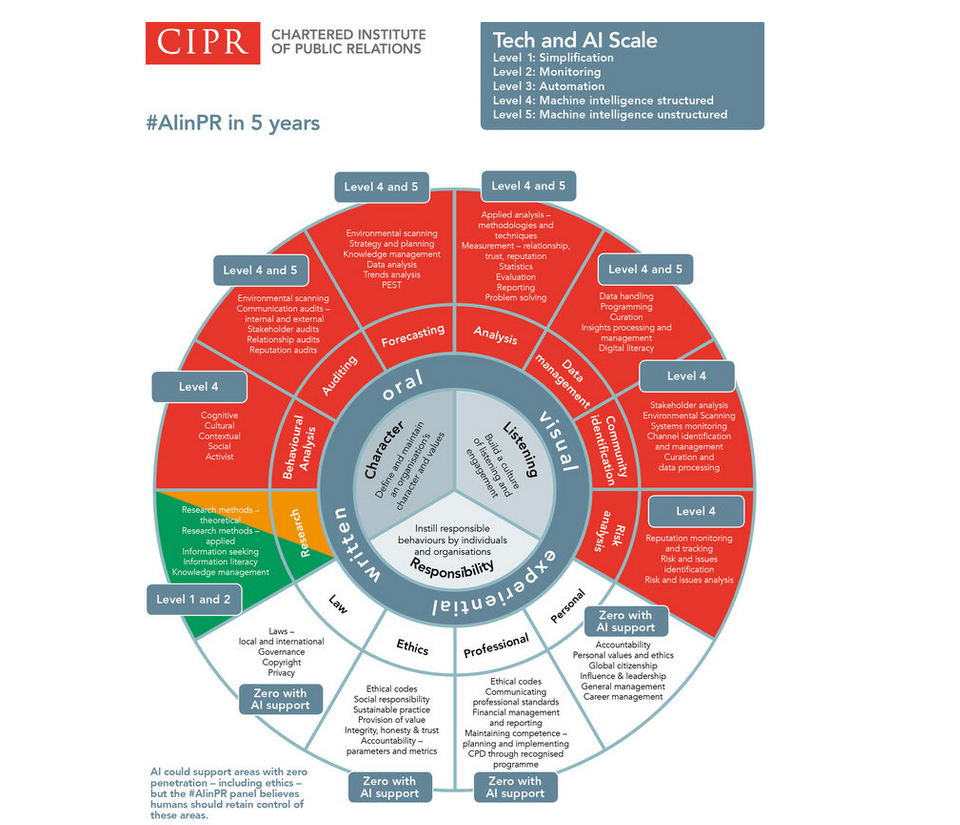
Monday August 3, 2020
How AI is Transforming PR and Marketing
“Siri, what is the square root of 2000?”
“Siri, set a timer for 20 minutes.”
What would the impact look like up close in our day-to-day? Could it mean a reduction of jobs or the improvement of performance? In my opinion, it would be both. I am personally very optimistic about the way AI will transform the PR sector. AI is going to take over our mechanical and repetitive tasks, hence improving operational productivity. It will also free us to focus more on strategic and value-added work.
Operational Tasks AI Could Contribute To
A 2018 research ‘Humans Still Needed’ by Chartered Institute of Public Relations (CIPR) predicted that 38% of a PR practitioner’s total skills could be complemented or replaced by AI by 2023. PR functions like media monitoring, distribution, and content creation will be automated as computers can grab and understand knowledge faster than humans and perform repetitive tasks faster and more reliably.

An estimate of tools capability in 2023 with respect to public relations skills and abilities. Red colour represents the tasks that would be increasingly done by AI. Source: CIPR
Some of these tasks include:
- Produce press releases and media reports with Natural Language Generation or NGL.
- Transcribe audio files to written text via speech-to-text of media interviews, press conferences, podcasts, and presentations.
- Translate any text (e.g. press releases, blogs, articles) into videos or speech that complements written and visual content to give your audiences an alternate way to consume information.
- Translate any audio, video or text files into multiple languages for wider distribution and remove the language barrier in our day to day life, especially if we are working with global clients
- Provide relevant and frequent news to stakeholders in real-time
- Find and connect with influencers that are most likely to have a connection with your audience
- Automatically provide journalist contacts and publication names in your niche and with a high likelihood of covering your brand, instead of having to manually build lists using categories and keyword searches.
- Analyse the journalists’ previous coverage and provide custom story angles based on journalists’ niche and interests.
- Predict if negative reviews will be written about your brand, and if so, what their impact would be. This helps in managing your reputation by taking preventive measures.
- Monitor for appropriated content, fake news and videos about your company to be able to respond quickly to protect your brand.
Innately Human Skills of Storytelling and Relationship-Building
Apart from the above, AI has already taken over the management of our sales pipeline in significant ways, including identifying leads, writing emails, managing calendars, selecting and analysing the data to enable us to set achievable targets. But despite the efficiency of AI-driven tasks, humans will also always be needed for tasks that are innately human in its nature. For PR, this means the integral aspects of the job: storytelling and relationship-building.
This is because relationship-building, a core aspect of public relations, requires emotional intelligence and developing trust with journalists, customers, and shareholders. Similarly, storytelling requires creativity, empathy, and self-awareness. “All of those traits are fundamentally human—and they are what will protect us from the artificial intelligence overlords,” says Gini Dietrich, founder of SpinSucks.
How to Leverage AI in PR
In fact, humans and robots can and should work together to improve performance. For example, a recent project by MIT Media Lab and McKinsey showed that AI can gather and analyse data regarding patterns in emotional arcs in video stories. It then prompts content creators on when to dial-up on certain emotions to improve engagement. It means PR professionals would always be needed to tell stories of brands, leaders and products to connect with an audience, though they could use AI to show them where they need to strengthen the emotional pull. “AI holds great potential for the content creation industry. By no means should it be viewed as a threat,” writes George Karapalidis, head of data science at Vertical Leap.
Regardless of the number of tasks that AI could do and improve the productivity and performance of in the PR sector, the uptake and willingness to adopt the technology in the sector are low. I noticed this when I moved from the finance sector to the PR sector 2 years ago. According to a 2018 CIPR report titled ‘The Effects of AI on the Professions‘, PR falls behind other professions and is not as progressive as professions such as HR and management consultancy in its thinking and planning around AI.
Whether or not you are prepared for the continuous change the AI will bring to your business, the future is set to impact the PR industry. So to be stronger in the future, we must include it into our planning as it is going to become integral to our profession. This would include a forward-looking plan on how to:
- Up-skill and down-skill your future workforce.
- Educate your team and improve your knowledge about AI
- Identifying skills and areas in your business which can be delegated to AI.
Going back to our original example, Siri is only as useful as the operator. It means you need to learn the tricks to getting the most out of it. Since AI is built to complete narrow tasks, someone has to envision how to put AI to use and then apply AI to perform the task better than a human could. “We need more experience with these tools and more critical reviews to learn how best to use them and their limitations,” says Jean Valin, principal at Valin Strategic Communications, who wrote the CIPR paper ‘Humans Still Needed’ mentioned above. Once you are prepared and have sufficient knowledge, you would be able to leverage AI in your business by increasing revenue and reducing costs through more intelligent automation and machine-powered predictions. Because as Valin rightly says, regardless of the tasks and skills that can be automated or benefitted from AI, human intervention, sensitivity, emotional intelligence, applying good judgement and ethics will always be needed.
Curzon PR is a London-based PR firm working with clients globally. If you have any questions, please feel free to contact our Business Development Team bd@curzonpr.com







Follow us